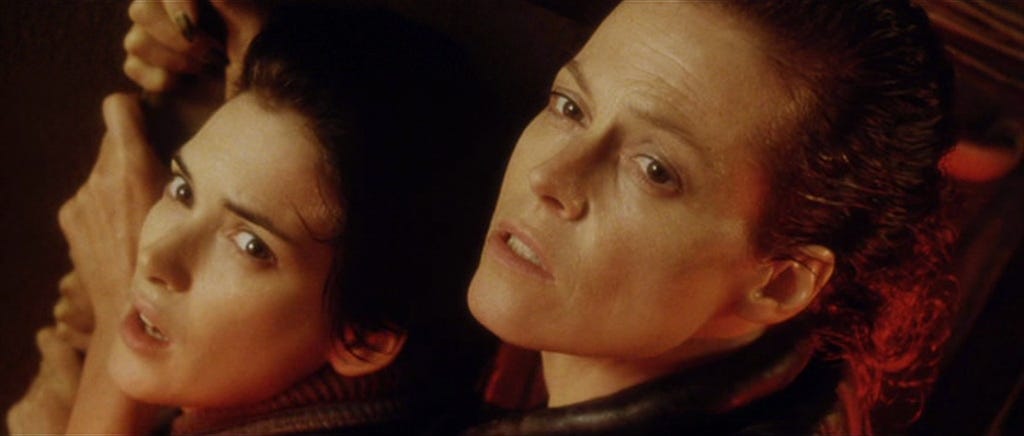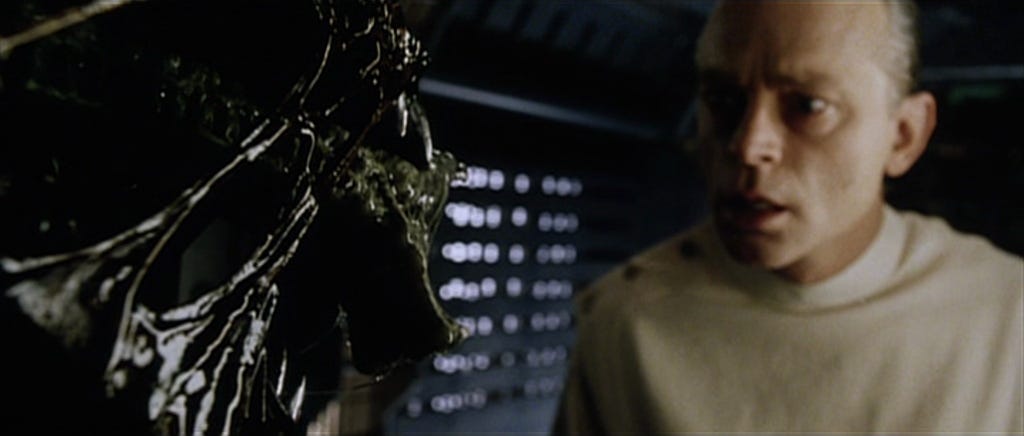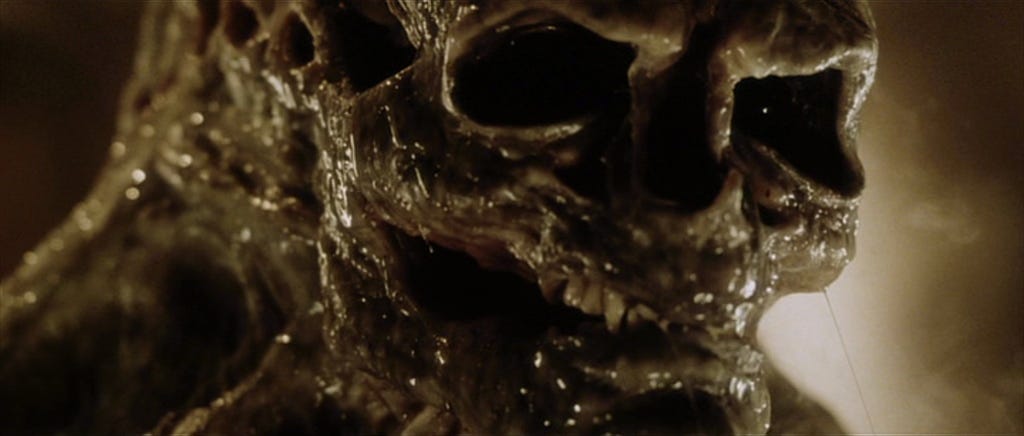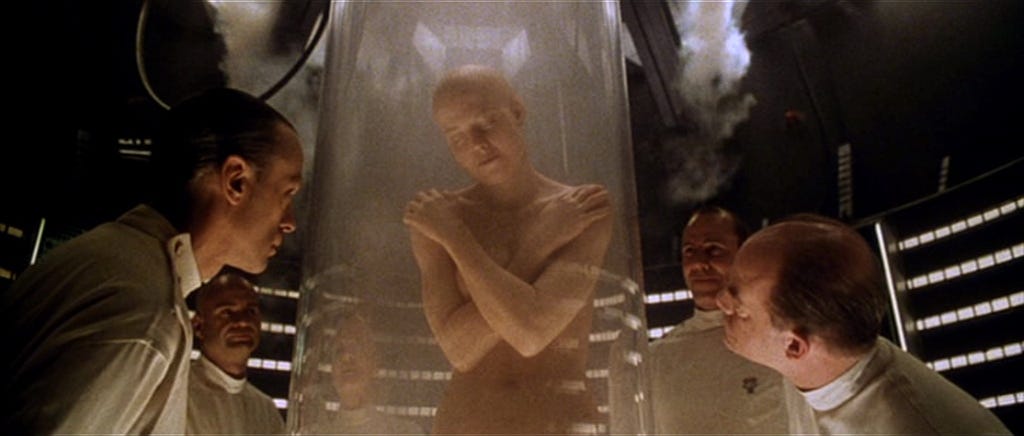Review: "Alien: Resurrection" is cuckoo bananas, and I love it
Movie of the Week #30
Welcome to Movie of the Week, a Wednesday column where we take a look back at a classic, obscure, or otherwise interesting movie, with writing of mine that’s never been published online before. Enjoy…
Alien: Resurrection
1997, Dir. Jean-Pierre Jeunet
Alien: Resurrection is insane.
It is bananas.
It is unhinged.
It is absolutely cuckoo for Cocoa Puffs.
I think I love it.
I treasure the Alien movies, as you’ll know if you read my long piece celebrating Ridley Scott’s Alien: Covenant, or my review of Alien: Romulus from last year, in which I wrote that “the Alien films stand toe-to-toe with Tom Cruise’s Mission: Impossible movies as Hollywood’s best, most interesting, and most reliable long-running franchise … I adore these movies, and I love just how malleable and protean they have continually proven themselves to be.” I think that is 100% true of Alien: Resurrection, too, but it was the installment it took me the longest time to come around on. When I first worked my way through the series, before Prometheus came out, I failed to give the oft-maligned fourth film a real shot. I was turned off by the aggressively weird tone – if you’re binging the series in order and go from the operatic, tragic ending of Alien 3 to a cloned Ripley playing superpowered basketball with Ron Perlman in Resurrection, it is admittedly a hard left turn – and I wound up switching the film off halfway through. I just wasn’t vibing with it, and for years, that’s where I left things. ‘The Alien movies are generally great, except for that weird fourth one that we don’t speak about.’
To be fair, I don’t think I was alone in that sense of dismissal, and while I now find myself amongst Resurrection’s defenders, I will admit it remains a pretty small island. I finally came back to the film when working through the series once more ahead of Romulus; as I found myself again appreciating the sheer diversity of tone, genre, and ideas in the Alien movies – that transformative quality that makes the series so uniquely compelling – I decided to give Resurrection another shot, knowing it would be weird and goofy and not at all like the other films, but finally allowing myself to go into it know that wasn’t necessarily a bad thing.
And what Alien: Resurrection actually is fucking rocks.
Resurrection is basically Alien as a crazy 1950s B-movie creature feature, or maybe even an Italian giallo film: something excessive, lurid, weirdly sexual, and gloriously silly, but put together with a real budget and a lot of technical acumen. Despite being made in 1997, right when we were starting to get a bunch of terrible CGI in American blockbusters (the Lost in Space film, with its infamously iffy effects, came out about 6 months later), Resurrection mostly showcases practical sets, effects, and creatures, and like the other Alien films, it looks great.
Unlike those movies, it has wild swings like “underwater Alien chase,” or “man uses the chest buster inside him to impale the bad guy through his forehead,” or “Brad Dourif as a mad scientist making out with a xenomorph through the glass.”
Every moment like that – and there are dozens – made me cackle like an idiot. The Aliens basically act like the Velociraptors in Jurassic Park this time around, scheming and messing with their victims in unexpected ways, like when they break out by tearing apart one of their own to use its acid blood to melt through the floor. The Queen turns out to have the ability to birth alien children like a human woman, and creates an unbelievably disgusting albino monster that is also kind of adorable, and who I weirdly felt sorry for when it gets one of the gnarliest deaths I have ever seen in a movie.
Resurrection is the film Jean-Pierre Jeunet directed just before he made Amélie, a whimsical grown-up fairy tale that is one of the most widely acclaimed and beloved films of the 21st-century. That sounds inconceivable, except for the fact that Winona Ryder has the exact haircut Audrey Tautou wears in Amélie, and that despite the copious amounts of bloodshed and violence, there is a sort of ‘whimsical’ sensibility to Resurrection, to the playfulness with which it bends and pulls at Alien franchise tropes, that does kind of remind me of Jeunet’s masterpiece…which, if I’m being honest, is a film I’ve never particularly enjoyed. I guess I just like my whimsy tempered by, or filtered through, horrific creature effect displays of blood and gore, instead of an endlessly twee sugar rush.
I probably just lost most of whatever cinephile cred I have by saying I prefer Alien: Resurrection to Amélie, but so be it. The heart wants what it wants.
If there is a single auteur behind the overall Alien franchise – at least in its original ‘Quadrilogy’ form before the series returned with Prometheus – it is undoubtedly Sigourney Weaver, and not simply because she stars in all four films. If, as I previously argued, the Alien films are singularly great because of how uniquely ‘malleable and protean’ they are, that quality is only unlocked because Weaver is able to modulate to each director’s particular tone and vision while maintaining some semblance of continuity between films. The Ripley of Alien, a normal working-class person who survives through ingenuity and perseverance, is very different than the Ripley of Aliens, an 80s action star who fist-fights the Alien Queen in a big mech and who is nothing like the Ripley of Alien 3, a suicidal depressive done with all this Alien shit and just trying to figure out when and where her inevitable death will be most useful. And none of those are at all similar to the Ripley of Alien: Resurrection, who is a completely different person altogether in a Ripley-shaped body – a person who is consistently bizarre, always horny, and not particularly interested in being a hero. The continuity maintained here is the sharp break in continuity: Weaver recognizes that she literally isn’t playing Ellen Ripley this time, the woman whose arc she traced in the previous three films, so she just gives a 100% different performance. And that might in fact be the key to what makes Resurrection work, because Weaver’s bizarre, gonzo performance gives us permission to enjoy Resurrection on a totally different wavelength than the previous films. Ripley’s gone, and she isn’t coming back; once we understand that, it becomes a lot easier to accept that Resurrection isn’t anything like what we’ve seen before.
There is, in fact, something about the bluntness with which this film frames the “resurrection” narrative that makes it a very potent literalization of the logic behind Hollywood’s endless sequels, revivals, and reboots. It might be even more potent now than when it was made, after nearly three more decades of Hollywood milking dry every cash cow they can find. In the film, the military literally clones Ripley from blood left behind on the prison world where she died, re-grow the alien inside her, and then rip it from her body and refer to her as a sack of meat. As a character with her own autonomy, Ripley did everything humanly possible to stop the forces of capitalism from having this, to end her story on her terms; but if a corporation has enough money and power, there is absolutely nothing an individual can actually do to stop them from keeping the money train going. And as the increasing list of deceased actors ripped from their graves to be CGI puppets in bad blockbusters can attest – names like Peter Cushing, Harold Ramis, and, in this very series, Ian Holm – what Resurrection posits isn’t science-fiction: it’s reality.
Putting humans in pods where they are forcibly exposed to the alien face huggers is also part of this bluntness; instead of searching an alien world and discovering this terrifying creature, we dispense with all that slow, methodical build-up and just get right down to business. It is a brutal, stripped-down version of endless franchise logic: People want the aliens. Let’s give ‘em the fucking aliens.
Winona Ryder’s character tells the new Ripley: “You’re a thing. A construct. They grew you in a fucking lab.” Isn’t that a perfect description of so many franchise films, especially these last twenty years of reboots and legacy sequels? Isn’t that the way we describe movies made for no other reason than to fill a box on a spreadsheet? When you see poor Harrison Ford having to come back again and again to reprise characters he had long since said goodbye to, because there were simply no other roles the industry would give him, and he is clearly miserable trotting these routines out one more time, wouldn’t it just be more honest to do this? To have him play a clone who has been forcibly resurrected, literally rebirthed against its will to go through the motions again? And then have those motions be complete batshit insanity, like the film itself is rebelling against the very idea of its own existence and trying to finally kill the franchise by turning it into something impossibly absurd?
This is the way. Alien: Resurrection is a film we should learn from.
Read the book 200 Reviews by Jonathan R. Lack in Paperback or on Kindle
Subscribe to PURELY ACADEMIC, our monthly variety podcast about movies, video games, TV, and more
Like anime? Listen to the podcast I host with Sean Chapman, JAPANIMATION STATION, where we review all sorts of anime every week. Watch on YouTube or Subscribe wherever you get your podcasts.





